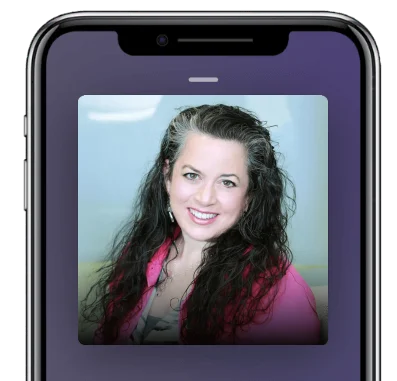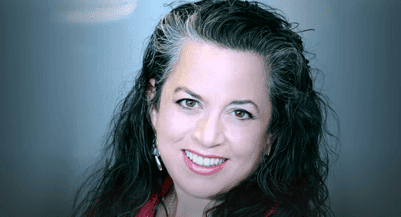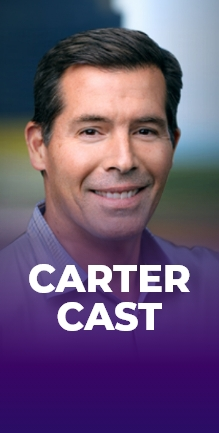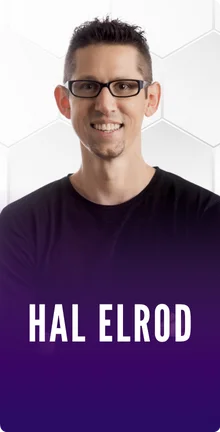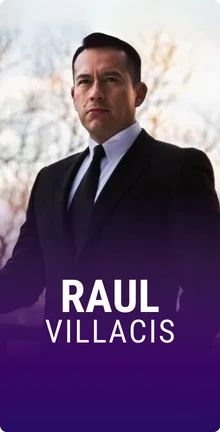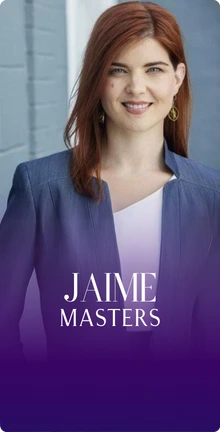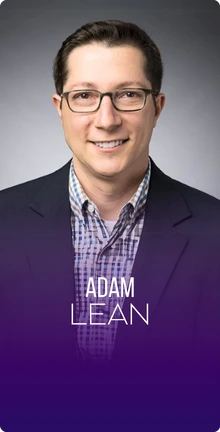Thanks so much. It’s great to be here.
Let’s talk about how you turned your scrappy startup into a global business that you were then able to sell. I too bootstrapped a company. I didn’t have any money and no investors or anything and I took out some student loans then dropped out of my Ph.D. I started a company and winged it from there but I’m curious to hear your story.
Back in 2003, I was living through the dot-com bust here in Silicon Valley. I was working in high tech in product management and product marketing. I was working at a company where layoff after layoff was happening and yet we were expected to do all the same things with fewer resources. It was becoming a pretty bleak time out here. I had a pretty good job, but it’s all the same when the seventh or eighth layoff came. I started to think, “I might be on this list.” They’re getting pretty lean but I wasn’t on the list. I spent all weekend feeling super depressed that I had to go back and I thought to myself, “I don’t have to. I am free.” I am a free person who can make a decision that I don’t have to do this anymore.
I went in on Monday and I asked if I could get myself on the list. We negotiated and I ended up staying for six more weeks doing some consulting with them to finish up a project. I did negotiate my exit and at the time that I left, I assumed I’ll get a different job at a different company in the same industry. After a few weeks of, I’m going to regroup. I’m going to take a few days to get out of that constant stress mode, but I never was pursuing getting another job in that same industry. I’m a pretty directed person. If I have a goal, I keep plugging away until I achieve it and I wasn’t plugging away at all. I had another moment with myself where I was like, “Maybe I don’t want to be in this industry anymore, maybe I don’t want to have this job anymore and what will I do?”
I was a single woman. I had a condo I bought by myself. I had quite a bit of savings, which was why I felt comfortable getting myself laid off in the first place, is because I had quite a bit of cushion. Still, this was not something I could float along with for months and months. At the same time this was happening, I had started to blog for personal reasons. I had a personal blog and I would read book reviews, movie reviews, and restaurant reviews. I had peanut butter and chocolate moment where I realized that this new fangled blogging thing was an amazing communications tool and therefore could be an amazing marketing tool for companies and organizations that were trying to reach their audiences and their users.
Do something that's a labor of love. Do something that's an experiment. Share on XI started out thinking it would be of great use to arts organizations and theaters because it was also very economical. It wasn’t this is something that’s scrappy nonprofits could do themselves and reach their audiences in a new way. I realized that makes it hard for me to pay my bills if all my clients are theaters, museums, and arts organizations. I started moving it into the enterprise part of the world and that’s what I was doing. Having never planned to be a consultant, but I was consulting in this space back in 2000 and late 2004. In early 2005, I met totally serendipitously my two co-founders of what would become BlogHer. We were not friends, we weren’t former colleagues and we didn’t know each other. Lisa Stone and I basically agreed to produce a conference in our first meeting.
I met Jory sitting next to her at a conference and invited her to come help and we weren’t a company at the time. We had this idea, we thought, “Why don’t we do it? If not us, who? Let’s do it.” We put our credit cards down to reserve the space and we started a blog and said, “We’re going to do this thing.” I always recommend to people that before you sign in blood to be someone’s co-founder or partner, work on a project together. Do something that’s a labor of love. Do something that’s an experiment. We worked on that first conference for about four months before it happened and you learn a lot about a person when you’re in the trenches working on something, especially something that has deadlines and a finite, like that event was happening.
We had rented the space. You learn a lot about someone’s working style. You learn a lot about their communication style and their work ethic. I always think that that’s a great thing for people to do before they go all-in. It was only after that first conference, that first BlogHer in 2005 that we said, “There’s something here. There’s a community here. They want things. We think we can help them pursue those things and get those things.” Then we started a company after that whole first four or five months of working together. At that point, we became that scrappy startup where we funded things with bartering and revenue and anything but the savings that between the three of us didn’t have that much. We bootstrapped for two years before we got our first round of venture funding in 2007.

2005 was your very first BlogHer. How many attendees did you have?
There were 300 attendees. We were at what used to be the Tech Mart at Santa Clara. It doesn’t exist anymore. We have 300 attendees, which was our capacity. It was amazing because it was all of these people from all over the country and in fact, we had many international attendees and it was a one-day event. We had a no-host dinner the night before. It was a one-day event but that’s the thing, you could tell at that time that women who were pursuing this and who were pouring their heart and soul into their blogs. They were hungry to be part of a community and they were thrilled to discover they weren’t alone and that there were other people who were as passionate about this new form of communication and new way of using technology. For a lot of women who are outside Silicon Valley or outside some of the places maybe in New York where it’s a media center, they had felt quite lonely and like they have this weird little hobby that nobody understood.
You empowered these women to turn their “hobby,” as society saw as blogging, into a valid and valuable career path or even a business path. For example, my daughter, Chloe, who started her speaking career at your BlogHer 2007 when she was only sixteen years old, she ended up speaking at fifteen different conferences over the years since that. It’s so inspiring to see the impact that you’ve had on people. Do you want to share your experience with my daughter, Chloe?
Part of the genesis of BlogHer was that we were seeing mainstream media begin to pay attention to the blogosphere, but all the sources that they used for their stories, all the blogs they were linking to we’re all a bunch of folks that looked pretty much the same as all the people who dominated media already. We thought, “This is such a democratized form of media. How much of a wasted opportunity would it be if we recreated the old boys club that traditional media has?” We wanted to do a conference where all the experts just happened to be women and we’ve had some hearty men who have been speakers and experts as well, like you, but the vast majority had been women, but most of the time, we weren’t there to talk about being women.
We were there to talk about our areas of expertise and our subject matter. As we went along, it wasn’t enough to say, they’re going to be mostly women. We were going to take to heart this mission to bring exposure to way greater diversity of a person and an expert than mainstream media seems capable of doing. Then we had to care about diversity across so many dimensions. At a certain point, that included age. We don’t want to just have a bunch of twenty and 30 something sitting around talking about it because there are teens out here doing it. There are boomers. People have this very dismissive attitude about older people in technology. I’m not a digital native. I didn’t use my first computer until after college.
There are plenty of people at this wide range. When we saw Chloe and what she was doing, we’re like, “This is amazing. This is a whole generation of people who have an entirely different expectation of what they can do, how they can earn their living, how they can communicate.” There’s been a lot of talk about digital utopians from back in that day who saw all the great parts of what the internet could do and maybe missed what might be dangerous or negative about it. I would say that we were definitely pragmatic utopians and that from very early days, we had a code of conduct on our websites. We were very aware of how communications mechanisms can go wrong, but we were also super excited about the opportunity.
We want to empower women, to know that you were doing something of value, that you were allowed to monetize if you were doing something that was a value, you could build a career, you could build a business. This is also an amazing tool for support, for communication, for building relationships, and for expression. It wasn’t only about career and business. It was also about the value of simply getting a window into people’s lives and understanding them. At the very first BlogHer, Alice Bradley, who was a mommy blogger, stood up and said, “Mommy blogging is a radical act,” which is something we quoted frequently. It’s true that to see into someone’s life, and we’re used to it now, we’re used to getting intimate windows into people’s lives, but we weren’t then and to see the reality and the not so pretty parts too, was radical.
Chloe was this amazing person who was succeeding and being so creative and so innovative and so represented what her generation, was going to be able to do differently and think about differently. It was so great to have her back at BlogHer. Now, she’s a grown-up. You must be so proud. I felt a little proud too.
Debt is not a dirty word and debt comes with a lot of different expectations versus investment. Share on XShe even made it on to MSNBC. There was someone from MSNBC who came to BlogHer and interviewed some of the speakers. She interviewed Chloe and she spoke so eloquently about SEO in a way that was accessible and not super geeky, but very value-added. She got some great clients from that TV appearance, including the State of South Carolina. The State Treasurer saw her during her TV appearance and they hired her for a website that the State Treasurer’s Department was launching. She credits you and the BlogHer Conference and organization as getting her sea legs. She was terrified of speaking at first.
It was a process for her to become more comfortable with that, but she was on a panel when she spoke at BlogHer the first time. Doing a Q&A panel, not having a prepared PowerPoint was a little easier for her. She spoke about how to make passive income with AdSense with her Neopets blog. At the time, Neopets was the thing for kids. They were loving it and tens of millions of kids were addicted to that platform owned by Nickelodeon. She was an expert on it and sharing all of her game cheats and tips and tricks on a blog. Monetizing that better than flipping burgers at McDonald’s or earning money by babysitting, that’s for sure.
That’s very indicative of what was possible with this new medium was the nichefication of interest and attention and also then the nichefication of income and revenue generation and that people cared enough, you could go find someone who was an expert on any narrow topic you were interested in and that person could benefit from being that expert and it was democratizing expertise. That was the opportunity and the vision.
Let’s talk about how you were able to turn this passion for helping women into a global business. There are plenty of organizations that run conferences and there are plenty of organizations that have websites where there are many contributors, but there aren’t that many that are able to exit for hundreds of millions of dollars or whatever it was that you guys exited for.
There are plenty of companies that did all the individual components of what we did, plenty of multi-contributor websites, plenty of conferences. We also had our network where we were helping people scale out of their websites. We believed in the distribution of the network and not trying to bring everyone into our single site. We didn’t try to hold everybody because that wasn’t how the internet was going. You wanted to find people out where they are and provide value to them out where they were with so many choices. The network allowed people to keep their sites, keep their blogs right where they had them. We would serve their ads and line them up for marketing programs, marketing initiatives right where they were, right where they had built their influence, right where they built their community.
By distributing it all over, we had a broader reach. We had less overlap. We could go into a lot of different communities and that network was what brought us scale because if we have been a website in the conference, we probably should not have been. In that case, we wouldn’t have been the company that should go out and get venture funding because the scalability of it and the opportunity to have a multiplier on what you’re doing is a lot less. That’s something people don’t understand.
It’s so funny because I don’t think that the culture of VC funding as the route you wanted to go with any startup, I don’t think that existed. It’s something that became a mythology. Now I see so many entrepreneurs who are having this argument with themselves about whether they should go out and get funding and when they’re thinking of funding, they’re thinking of venture funding. If they asked me, my answer is nine times out of ten, no. There are other ways to get capital. There are other ways to grow your business.
Once you take that funding, you have to think about what outcome do those investors want on the other side. The outcome that a bank wants on the other side of a loan is way different than the outcome a VC wants, which is different than the outcome that an angel or your friends and family wants. Once you take money, you have to worry about the outcome that that provider of the money is expecting. That’s your duty. That’s your job to worry about it. If we had just been doing the website and conference then I don’t think we would have needed nor sought, nor been doing ourselves any favors by getting venture funding.
It was the network that allowed us to scale to millions and millions of ad impressions and that’s what made it make sense to get the funding. Whenever I advise entrepreneurs, you have to have some serious conversations about what do you want to do? What do you want to focus on? How do you want to grow? How much do you want to grow? How long do you want to be doing this? All of those things go into this decision about, “If you need more capital, how do you raise that capital?”
Let’s quickly run through the different ways of raising money, VC being one of them, but there are plenty of others. What are those options?
There’s your own savings and your own personal debt. I went through my whole life savings and had $50,000 in debt when we got our first round of funding. That wasn’t sustainable for the long term. Part of why we got funding though is because we wanted to grow much more quickly than we had been doing organically. What we were doing organically was great, but we wanted to grow more quickly and for that, you need people, you need marketing, and you need more. That’s why we got funding and also because that was growing the network, which is where the scale was. There’s your personal savings, personal debt, and personal revenue that you’re making. Lisa, Jory, and I were all consulting for the first year we were bootstrapping. We were also still consulting with other clients. There are small business loans. People look at debt like it’s a dirty word. Every company in the world has debt. It’s normal.
Once you start having actual receivables and payables, most companies need some line of credit to help them bridge that gap. Especially like hardware companies, device companies, consumer product companies, they need something to help them manage their flow. Debt is not a dirty word and debt comes with a lot of different expectations versus investment. Even if you do debt-equity where you’re giving a little piece of the company, it’s usually so small compared to what an investor will look for.
I always ask people if they don’t have debt and their revenue, their cashflow positive, but they want to invest in something specific to help them get to the next level. I’m like, “If you don’t already have debt and you want to get to the next level and you’re basically cashflow positive, take some debt. Take out a loan and get yourself to that next level that you think you could be in.” You’ll have to pay back that loan and maybe you’ll have given up a tiny piece of equity, but it can certainly be a better bridge than getting external funding because you need a little cash infusion to get to the next level.
Even if you don’t have a need at the moment to get funding in terms of debt funding, maybe go and ask for that anyway because the best time to ask for money from the bank for a line of credit is when you don’t need it and you’re very comfortable.
Every business should have a line of credit probably available because things happen. You can’t control macroeconomics and you can’t control world events or acts of God. There are stuffs out of your control and a lot of us make choices based on a certain level of arrogance in a way. We are only looking at what will happen if everything we think we should do, we do and it all works exactly the way we think it will. We sometimes don’t build in that cushion for, stuff doesn’t always work the way you think it’s going to or step beyond your control happens that interferes with your business and then to have nothing to fall back on is bad idea.

I also urge people to do friends and family round. That’s not available to everybody, but it’s more available to people than they think. It’s hard to ask people for money but the fact that we decided it’s easier to ask strangers for money and then give them input and say into our business versus people we know and love and who want us to succeed and probably won’t have the same requirements on control and input. Sometimes, depending on how big your company is, a friends and family round is great. Angel investors are certainly less likely to have as much of an expectation of both return, control, and input than a venture capitalist. The role of angel investing is changing. I feel like now, lots of the VCs have launched little angel funds because they see the opportunity there.
It used to be that when we took our first round of funding. It was $3 million and that was considered a very small venture round. That was considered almost like angel plus, but we went through a traditional VC and now that’s becoming much more common that the VC will have an emerging business group that makes these “smaller investments.” There are all sorts of opportunities there. The three of us had a little investment property we sold to help fund and all of these, we were funding our own living. That’s the thing. After that first putting a deposit down on the venue, it’s not like we put money into the company. We put our blood, sweat, and tears into the company but we were generating revenue pretty quickly. We did some bartering.
Our first website was a barter with a company that we then gave marketing credits at our conference and online, but we needed money to live. We needed to pay our mortgages and rents and we needed to pay our expenses. That’s what we funded for ourselves because we were paying other people before we paid ourselves. I know some folks will tell you that that’s not smart and I happened to disagree with them. It depends. I totally believe that you have to be able to have a sustainable life. Someone once asked me about, once you do get funding, how should you pay yourself? What kind of salaries should you pay yourself?
I feel that once you get funding, you need to pay yourself at least some reasonable salary because if something happens to you, you don’t want having to hire a non-founding executive to totally blow your budget. You need to have some realism built into your plan about how much it costs to have a CEO or a COO or head of sales or whatever. Secondly, if you’re not paying yourself a sustainable salary, how long can you stick it out and how focused are you? You want your founders very focused, feeling very not comfortable but not worrying about how they’re going to be able to make their rent, that is not making you a productive founder. I don’t think we paid ourselves what we might’ve been able to get at another company that brought us in, but we certainly paid ourselves enough to stop worrying about how we were going to make our rent or our mortgage payments each month.
You mentioned one of the ways to raise money initially besides VC is friends and family. Does this require that the friends and family members be accredited and maybe you could define accredited investors for our audience?
That’s a good question that I don’t want to pretend I’m an expert in. I had someone splitting expenses with me. That was my friends and family. I had someone at home who paid half the bills, but we didn’t do friends and family. That is a good question and I don’t think so, but I know that you do want to do written agreements with them. You do want to have a plan about how you’re paying them back and with most friends and family, it’s more a loan style than it is an investment style, which helps avoid some of that accreditation issue and it doesn’t dilute your ownership.
If you are going to take Angel or VC funding, I now regularly advise folks I’m consulting with to whatever number they think they need for their first-round to double it and go out looking for that. Most of the time I don’t look back and say, “If I knew then what I knew now, here’s what I would do differently.” To me, that’s not fruitful. You made the very best decisions you could make at the time with all the information, knowledge, and expertise that you had. The hypothetical of it is that’s not how I want to expend my mental energy, but I will say there’s a couple of things that were macro things and one of them is that I wish we had taken a bigger first round because getting multiple rounds ultimately dilutes your ownership more than taking bigger, fewer rounds.
Repeating the theme of you can’t control the macro of what’s happening in the world. We’ve got our first round of funding at 2007 and we thought we took enough funding to get us to profitability, but two things happened. Number one, this digital media industry changed so much. The smartphone didn’t exist when we started. It hadn’t even been launched when we negotiated our first funding deal. Having to have everything go mobile was not in the plan and then also the advent of other things like programmatic advertising and ad tech that was going to require investment and online video becoming something that was going to require investment. Maybe not every industry is quite as dynamic as media and digital, but it was a very dynamic business where we had to reinvest pretty frequently.
The second thing we got our funding in the middle of 2007 and by the next year full-on recession and that changed how our customers were spending money and it changed therefore how we were generating revenue and we had built ourselves the perfect runway for that pre-recession economy. We ended up getting another round and I tell people now, your plan is great but it’s just a guideline. Stuff’s going to happen. You can’t predict no matter how smart you are and you need to build yourself in more of a cushion.
You don't control everything that drives the revenue coming in and you don't control everything that drives the expenses you're sending out. Share on XYou calculated with the knowledge that you had in the understanding of where things were going without knowing that the bottom was going to fall out of the economy. Just a year later, you figured $3 million would be sufficient or was that the VC saying, “We’re going to fund you $3 million and figure out how to make that work”
That’s what we asked for and we asked for it out of a sense. We were cocky personally. We felt like with our plan, we didn’t want to give up too much ownership. We were only three. We were each one-third equal owners. We didn’t want to give up too much ownership, too much control. We did our planning and looked at our trajectories and built-in our contingencies and we felt that $3 million would bridge us to being profitable to the degree where we would be fine. You don’t spend that $3 million all at once. That $3 million was going to last us for enough time to build this aspect of our business and get to the point where we were generating that money on our own. We did not predict the recession or that we didn’t predict how much of an impact that would have on our income, but also we didn’t predict the next few years of development of the industry that would require more investment.
My point is you don’t control everything that drives the revenue coming in and you don’t control everything that drives the expenses you’re sending out. There are things that happen that drive you into different situations. There is a scenario in which our plan would’ve worked perfectly, but we shouldn’t have been counting on our plan working perfectly. We should have been counting on our plan we’re working perfectly, knock off 30% for all the things you can’t control and can’t predict. That’s what I would do now. I would definitely build in 30% or 40% of deviance for the stuff you don’t know is coming but is bound to come.
What was your second round for?
Our second round was then $5 million. Our first round was with Venrock, which was a pretty traditional VC in Silicon Valley. Our second round was strategic and institutional. At the time, it was the GE/NBC Peacock Fund. We had some partnership with iVillage, who was a big ladies’ website and that was a strategic investor. It was more in the media business. We did a third-round next year with another VC. Then we didn’t take funding again for quite a long time. We took a little bridge round. Five years later, we took a small bridge round to fund something very specific. Most of what we raised funding for was either technology or humans into being one of the most expensive things.
There’s probably another funding option given the technology these days and that’s an ICO, Initial Coin Offering.
There’s crowdfunding and there’s ICO. I will say Jory joined blockchain and crypto-focused company. She’s been digging into that since she left. That’s something she’s very interested in right now. I am a dabbler who owns 100 Bitcoin or something just to see what happens. I’m not the big expert on that one. Crowdfunding can be super interesting to develop an audience or user-base. It’s almost like a marketing initiative for most people. It’s a hell of a lot of work. Everyone I’ve ever talked to who does crowdfunding and succeeded, it was a full-time job for three months to prime the pump, set up the thing and then keep at people.
That’s something people should be aware of. It’s like anything else. When they call these billion-dollar valuation companies unicorns, it’s because most of us are not going to achieve that. It is very unusual. I would say this crowdfunding, people sometimes have a vision that they’re going to put this up and people are like everyone they know, is going to rush and want to give them a bunch of money right away. Those big crowdfunding success stories are unicorns in their own right.

If you’re doing Kickstarter or something similar, it’s almost like you need a viral video marketing firm that specializes in Kickstarter to crack this nut and do crowdfunding in a successful way.
Unlike anything in our business back when they started, there was a lot less noise. You could have a much better chance of being signaled. Now, there are so many crowdfunding platforms. There are so many crowdfunding initiatives. It is very hard to rise above the noise. It’s like, “Who gets featured?” It becomes a game of, “Do you know anyone at any of these platforms?” You can make sure you’re on the featured list because that can make a huge difference.
Kathryn Finney, from digitalundivided, wrote a great medium piece on everything she did to make her their crowdfunding initiative successful. It was months of building her list of people, preparing them, getting them primed to give money when the time came up and then relentlessly reminding people. The fifth time someone you consider a friend is begging you to donate, you’re like, “I’m going to feel so guilty if I don’t.” You’ve got to be ready to be shameless, which I recommend entrepreneurs to be shameless.
That reminds me of how shameless I was to get my business started. A couple of months earlier, I dropped out of a Ph.D. program and I was up to my eyeballs in student loan debt. The way that I have launched and had my agency get its first two big accounts was I talked my way into a conference as a volunteer. It was called How to Market on the Internet. It was an IQPC Conference. It was several thousand dollars. I didn’t have the money for it, so I talked my way in as a volunteer.
I was running around with the microphone and I realized that I could chime in and help answer the questions that I didn’t think were adequately being responded to by the panelists. That was pretty cheeky of me but by the end of the day, I had a big stack of business cards, people came up to me and said, “You know more than the speakers about this stuff, that’s amazing.” I had two big accounts from that, each was worth $500,000 in customer lifetime value to my agency. I never had to get angel funding in those initial years.
I didn’t realize that I had created some enemies. People didn’t like that I upstaged them and so I was de-invited from volunteering on day two by the conference organizer but it was totally worth it. The irony of all ironies is a different IQPC producer contacted me a few months after that, inviting me to speak at How to Market Educational Programs on the Internet and invited me to chair that conference and to do a post-conference workshop. I got the same organization that kicked me out of their conference, inviting me to be the head person for one of their smaller conferences six months later. How many attendees did you have in 2007 BlogHer that was the year that you got the first round of funding?
We announced that the first round of funding at the conference. In 2005, it was 300. In 2006, it was 650. In 2007, it was 800 in Chicago. We had 1,200 the next year. We’re going up. Our largest conference was in New York in 2012 and that was 5,000 people. That was too big for the venue that we had. We had announced President Obama as our opening remarks by live video and I spent months nailing that down. They kept wanting to send me a canned video and I said, “These are people who are digging into their pockets to come to these events in person.” I don’t think it would come off that well to do a recorded canned video.
I kept saying no. Every time I would hang up the phone with the President staff after having told them no to what they wanted to do, I would have these crises of faith, like, “What am I doing.” Finally, a week before the conference, they said, “Yes, we’ll set it up.” He wasn’t going to go to New York because it wasn’t a battleground state and this was a couple of months before the election. He wasn’t going to be in New York. He wasn’t going to travel there as it so happened he videoed in from Florida and his person on the weekend even told me it’s a go and we started arranging it and she later told me that she was going to put a picture of me on her vision board for persistence basically because she said, “The fact that you kept saying no kept this alive because we wanted to reach your audience and we kept thinking we could talk you into like this canned video, which would have been easier, but you kept saying no.”
In the end, they gave in and did this live moment. We announced that and lots and lots of people wanted to come see that. That was probably our largest audience and after that we were like, we need to have this be a reasonable size, where we can deliver the high touch experience that our audience and our community expects. At that point, we rethought a little bit and we were never that big again which was a positive plan.
Who is your biggest speaker? Was it President Obama or was it somebody else? I know I’ve seen some great speakers at BlogHer conferences, like Arianna Huffington. Kim Kardashian was quite a good speaker. I was not sure what to expect.
I thought she did a good job. That’s why I interviewed her in 2016 and she had some smart things to say and it’s a lesson on being open to people you might not expect having some wisdom to share with you and she did. Last year we had Serena Williams, which was thrilling. I thought it was beautiful, nearly ready to have her baby. She lives in Florida and we were in Orlando last year. That was fantastic. I’ve interviewed folks like Martha Stuart, Gwyneth Paltrow, Kim Kardashian, and Tig Notaro who’s a comedian. I watched one of her specials on Netflix and we had Sheryl Sandberg when she was launching LinkedIn. President Obama was a huge moment. We’ve had Arianna and Guy Kawasaki. I still think he’s our only male keynote interview we’ve ever done.
For many years, you didn’t take on any male speakers. I remember you turning me down year-after-year.
It’s so funny because the very first time we announced BlogHer in 2005, Guy reached out to me and wanted to speak and I told him no. He was like the Obama folks. He was so taken aback, like, “What? You don’t want me?” I’m like, “No. You’re lovely, but this is what we’re doing.” It started to change that when we launched our food conference BlogHer Food, which was our second significant conference and it was 500, 600 people as opposed to 3,000 to 4,000 people. We asked the community because in the food blogging world, people don’t see them but there are some very prominent male food bloggers. At that time, there were lots of folks plugging away who were men and when people talked about food blogging, like when they talked about parenting blogging, they never used to include any men even though there were men talking about that.
When we got ready to launch food, we pulled the community and said, “Do you think we should keep this policy of women-only speakers? In this case, if our goal is to bring exposure to people who are doing great work and aren’t getting seen, should we include men in the community?” The Food Community resoundingly said yes. That was the first time we had quite a number of men speaking of food and then we started to realize that we loosened up a little bit and we had made our point. If you say you can’t find a woman who is an expert on a topic, you’re probably not looking very hard. We did start to have men, but it was always a couple of guys and 120 women. In the food blogging scenario, it was different, but at the annual event it was still very heavily dominated by women.
It was such a strange experience to be at your conferences and to have 95% of the audience be women. It was a strange experience for me to be in a conference where I was the minority by far and yet it was such a welcoming environment too. I felt not discriminated against or anything. I wonder what it’s like for women as a man. I can’t fully appreciate how difficult it is for women.
They don’t make the same money for doing the same job that men do and they get pushed out of promotions, out of conversations. It’s shocking, it’s unfair and men don’t take it seriously enough because we’re not close enough to experiencing it ourselves. We can see other people experience that, we can feel empathy for it, being inflicted on loved ones, but we don’t truly know what it’s like. It’s not cool, it’s not fun. It’s awful and we only get little glimmers of it.
It is very hard to understand what things are like if you don't have to live it. Share on XWhat’s so powerful about the #MeToo Movement was the day-to-day stories. I do think a lot of men don’t realize day-to-day that how much calculation a woman is putting into where she is and how she speaks and what she’s wearing and where she’s going and who she’s with. Not only around career, it’s not just about career advancement but about personal safety. It is very hard to understand what that’s like if you don’t have to live it. Just like it’s hard for us to understand, when I speak to my black friends, especially black male friends about the calculations they make about making sure they don’t appear dangerous to people so that they don’t have to interact with any law enforcement.
We can’t understand what that’s like when they leave their house and are like, how do I make myself unthreatening when they’re not threatening. Some of the most powerful storytelling and in the end, blogging was always about storytelling that has come out of the last few years is through movements like #MeToo and #BlackLivesMatter, all of these stories. With the Parkland kids and stuff going on with gun safety where people are telling stories about what it’s like to live another life.
If you haven’t lived, you cannot understand but maybe storytelling takes you part of the way there. If anything takes you part of the way there, it’s storytelling and that you can find a glimmer of understanding in someone else’s story in a way that we’ve proved, data doesn’t do it. I’m a super data geek. I did research as a blogger for years. I’m doing some research right now with one of my clients, I love research, but data does not move people. That has been my experience.
Storytelling is not just in text form, like in blog posts, but also in video. One of the most powerful expressions that I’ve seen is the ten hours of walking in New York City as a woman. Did you see that video?
I’m 54 years old. I am no spring chicken. I don’t color my hair. I have a very prominent gray streak. I don’t care. It’s not my thing. I don’t go around and I’m used to working at home. I’m used to yoga pants and a sweatshirt every day. There’s nothing fancy about me. It was on a weekend, I was dressed in yoga pants and a sweatshirt and I was meeting someone for brunch in New York. It was broad daylight, [11:30] AM on a Saturday or Sunday morning and I was walking down 9th Avenue and some guy who was probably in his twenties made a crude comment to me. He used an infantile word for a body part.
I wanted to say, “Do you talk to your mother with that mouth? Can you say a more mature word than that? What is wrong with you?” As a woman, you can’t know, is this the guy who if you say something to him, he’s going to get super hostile and physically in your space? You keep walking. You ignore it. Your peripheral vision is now totally turned on, is he following me? Did he just want to say that thing to me and let it go? Was that just his fun activity or is this something worse? You don’t know until you’re through it and past it which situation it’s going to be.
I’m sitting there going like, “Everyone talks about women getting invisible as they get older.” I would like to be more invisible because that was amazing to me. It was such an example of how there’s nothing a woman can do to control whether certain men want to speak that way to them or be that way to them. They cannot dress a certain way. You cannot act a certain way. To taking us full circle back to running your business, you cannot control all these macro factors and that level of uncertainty in your personal life is a little harder to deal with than there’s always going to be uncertainty in your business life.

I’m curious to know if we can close the loop on the evolution of your business. If you could share with everyone what it was like to exit BlogHer and sell the company to SheKnows Media.
We had been at it for almost ten years when we sold to SheKnows and what was looking us in the face is another reinvestment period because we had been doing a branded video when brands were funding these initiatives, but we were not set up to start being a video content company. We felt like that was a future thing that needed to happen. We looked at each other and said, “How would we make that happen? Do we need to take another round of investment to build the capabilities that we need here?” Maybe this is the time to join forces with another company that has those capabilities and brings that to the table, who needs what we bring to the table, which is the community and the distribution.
The other thing is that everything goes through cycles and whereas the market loved the distributed nature of our company for many years. They were starting to be this coming back to destination websites. Probably it was a precursor to people feeling like once again, that everything that was distributed was too out of their control and probably all part of the whole fake news, being worried about that. SheKnows was a company with very large destination websites, no distribution across the web. They also have video production studios and two different offices and lots of video talent. We thought we had overlapping missions and ethos, but orthogonal capabilities and best practices, best skills. We went through this process of joining forces with them.
You cannot control all the macro factors and that level of uncertainty in your personal life is a little harder to deal with. Share on XThe thing is doing that after so many years, parts of it were very freeing. A board meeting was no longer my problem. The overall big picture of the entire company and the responsibility for all the employees, I had a segment of what was going on, that was my responsibility, but it was a certain weight off as far as feeling like everything’s on your shoulders for a whole company full of people. It can be frustrating because they were slightly a bigger company than we were. You’re adding more people, you’re adding more layers, you’re adding more different communication styles. Most of them were in New York. Most of us were either in Silicon Valley or distributed all around the country. I do feel that companies are going backward in their ability to manage remote workforces.
I see it all the time. People want to build in-person teams. It’s a mistake. They miss out on talent and they even miss out on cost savings because the San Francisco, New York companies are paying the highest possible price when they could be hiring amazing people in other parts of the country and saving money. There was this freeing aspect and there was this frustrating aspect, but in the end, it was the best possible match for us at the time. I did stay the longest. Lisa left after one year, Jory left after maybe a year and a half, and I stayed for two and a half years. Part of that was because I was responsible for something that was quite new to the company. I wasn’t trying as much to fit how I did things or how we did things into how they did things because they didn’t do those things.
There was a much longer education and transition process that I could be responsible for. It was the right thing to do and also it was a hard thing to do. No matter how great the match maybe, you’re still giving up your baby and letting other people tell you if it’s ugly or beautiful, that you are not used to. That has its own adjustment period. Now that I’m gone, that has been weird too because I’ve never been someone who my job defined my identity, but if anything was going to do that, it was going to be BlogHer. After all the time I spent and how invested I was, I joke and say my next gig is I’m going to create an existential crisis con and get people together to talk about how we don’t know what the hell we want to do when we grow up again.
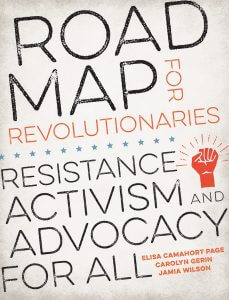
Thank you so much, Elisa, for sharing your journey and all the ups and downs and exciting that’s with us and lessons learned. If folks wanted to follow you on social media or pick up your new book, Road Map for Revolutionaries or to enjoy your aura, how would they find you online?
My website is ElisaCP.com and there is a whole tab there about my book. It’s totally a departure. I didn’t intend to write this book, but it’s all about everyday activism. It’s not about Washington and the Federal Government necessarily. It’s about getting involved right where you are, in your own company, in your own schools, in your own local community, to be more involved and engaged and making the world you want to make. I am @ElisaC on Twitter and @ElisaCP on Instagram. Most of my posts on Facebook are public. You can search my name. I am very political. If that’s not your jam, I share pictures of Vegan food and talk a lot about politics. I believe in bringing my whole self to the internet.
If you’re not polarizing, you’re not speaking up in the world. Thank you so much, Elisa, and thank you, everyone.

